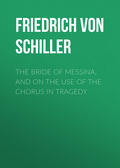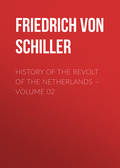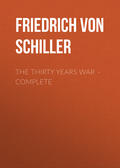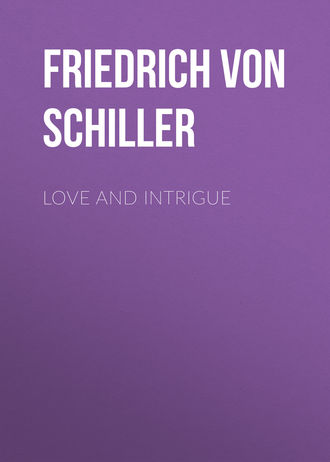
Фридрих Шиллер
Love and Intrigue
SCENE V. – A Chamber in the PRESIDENT.'S House
The PRESIDENT, with the grand order of the cross about his neck,
and a star at his breast – SECRETARY WORM.
PRESIDENT. A serious attachment, say you? No, no, Worm; that I never can believe.
WORM. If your excellency pleases, I will bring proofs of my assertions.
PRESIDENT. That he has a fancy for the wench – flatters her – and, if you will, pretends to love her – all this is very possible – nay – excusable – but – and the daughter of a musician, you say?
WORM. Of Miller, the music-master.
PRESIDENT. Handsome? But that, of course.
WORM (with warmth). A most captivating and lovely blondine, who, without saying too much, might figure advantageously beside the greatest beauties of the court.
PRESIDENT (laughs). It's very plain, Worm, that you have an eye upon the jade yourself – I see that. But listen, Worm. That my son has a passion for the fair sex gives me hope that he will find favor with the ladies. He may make his way at court. The girl is handsome, you say; I am glad to think my son has taste. Can he deceive the silly wench by holding out honorable intentions – still better; it will show that he is shrewd enough to play the hypocrite when it serves his purpose. He may become prime minister – if he accomplishes his purpose! Admirable! that will prove to me that fortune favors him. Should the farce end with a chubby grandchild – incomparable! I will drink an extra bottle of Malaga to the prospects of my pedigree, and cheerfully pay the wench's lying-in expenses.
WORM. All I wish is that your excellency may not have to drink that bottle to drown your sorrow.
PRESIDENT (sternly). Worm! remember that what I once believe, I believe obstinately – that I am furious when angered. I am willing to pass over as a joke this attempt to stir my blood. That you are desirous of getting rid of your rival, I can very well comprehend, and that, because you might have some difficulty in supplanting the son, you endeavor to make a cat's-paw of the father, I can also understand – I am even delighted to find that you are master of such excellent qualifications in the way of roguery. Only, friend Worm, pray don't make me, too, the butt of your knavery. Understand me, have a care that your cunning trench not upon my plans!
WORM. Pardon me, your excellency! If even – as you suspect – jealousy is concerned, it is only with the eye, and not with the tongue.
PRESIDENT. It would be better to dispense with it altogether. What can it matter to you, simpleton, whether you get your coin fresh from the mint, or it comes through a banker? Console yourself with the example of our nobility. Whether known to the bridegroom or not, I can assure you that, amongst us of rank, scarcely a marriage takes place but what at least half a dozen of the guests – or the footmen – can state the geometrical area of the bridegroom's paradise.
WORM (bowing). My lord! Upon this head I confess myself a plebeian.
PRESIDENT. And, besides, you may soon have the satisfaction of turning the laugh most handsomely against your rival. At this very moment it is under consideration in the cabinet, that, upon the arrival of the new duchess, Lady Milford shall apparently be discarded, and, to complete the deception, form an alliance. You know, Worm, how greatly my influence depends upon this lady – how my mightiest prospects hang upon the passions of the prince. The duke is now seeking a partner for Lady Milford. Some one else may step in – conclude the bargain for her ladyship, win the confidence of the prince, and make himself indispensable, to my cost. Now, to retain the prince in the meshes of my family, I have resolved that my Ferdinand shall marry Lady Milford. Is that clear to you?
WORM. Quite dazzling! Your excellency has at least convinced me that, compared with the president, the father is but a novice. Should the major prove as obedient a son as you show yourself a tender father, your demand may chance to be returned with a protest.
PRESIDENT. Fortunately I have never yet had to fear opposition to my will when once I have pronounced, "It shall be so!" But now, Worm, that brings us back to our former subject! I will propose Lady Milford to my son this very day. The face which he puts upon it shall either confirm your suspicions or entirely confute them.
WORM. Pardon me, my lord! The sullen face which he most assuredly will put upon it may be placed equally to the account of the bride you offer to him as of her from whom you wish to separate him. I would beg of you a more positive test! Propose to him some perfectly unexceptionable woman. Then, if he consents, let Secretary Worm break stones on the highway for the next three years.
PRESIDENT (biting his lips). The devil!
WORM. Such is the case, you may rest assured! The mother – stupidity itself – has, in her simplicity, betrayed all to me.
PRESIDENT (pacing the room, and trying to repress his rage). Good! this very morning, then!
WORM. Yet, let me entreat your excellency not to forget that the major – is my master's son —
PRESIDENT. No harm shall come to him, Worm.
WORM. And that my service in ridding you of an unwelcome daughter-in-law —
PRESIDENT. Should be rewarded by me helping you to a wife? That too, Worm!
WORM (bowing with delight). Eternally your lordship's slave. (Going.)
PRESIDENT (threatening him). As to what I have confided to you, Worm! If you dare but to whisper a syllable —
WORM (laughs). Then your excellency will no doubt expose my forgeries!
[Exit.
PRESIDENT. Yes, yes, you are safe enough! I hold you in the fetters of your own knavery, like a trout on the hook!
Enter SERVANT.
SERVANT. Marshal Kalb —
PRESIDENT. The very man I wished to see. Introduce him.
[Exit SERVANT.
SCENE VI
MARSHAL KALB, in a rich but tasteless court-dress, with
Chamberlain's keys, two watches, sword, three-cornered
hat, and hair dressed a la Herisson. He bustles up to
the PRESIDENT, and diffuses a strong scent of musk through
the whole theatre – PRESIDENT.
MARSHAL. Ah! good morning, my dear baron! Quite delighted to see you again – pray forgive my not having paid my respects to you at an earlier hour – the most pressing business – the duke's bill of fare – invitation cards – arrangements for the sledge party to-day – ah! – besides it was necessary for me to be at the levee, to inform his highness of the state of the weather.
PRESIDENT. True, marshal! Such weighty concerns were not to be neglected!
MARSHAL. Then a rascally tailor, too, kept me waiting for him!
PRESIDENT. And yet ready to the moment?
MARSHAL. Nor is that all! One misfortune follows at the heels of the other to-day! Only hear me!
PRESIDENT (absent). Can it be possible?
MARSHAL. Just listen! Scarce had I quitted my carriage, when the horses became restive, and began to plunge and rear – only imagine! – splashed my breeches all over with mud! What was to be done? Fancy, my dear baron, just fancy yourself for a moment in my predicament! There I stood! the hour was late! a day's journey to return – yet to appear before his highness in this – good heavens! What did I bethink me of? I pretended to faint! They bundle me into my carriage! I drive home like mad – change my dress – hasten back – and only think! – in spite of all this I was the first person in the antechamber! What say you to that?
PRESIDENT. A most admirable impromptu of mortal wit – but tell me, Kalb, did you speak to the duke?
MARSHAL (importantly). Full twenty minutes and a half.
PRESIDENT. Indeed? Then doubtless you have important news to impart to me?
MARSHAL (seriously, after a pause of reflection). His highness wears a Merde d'Oye beaver to-day.
PRESIDENT. God bless me! – and yet, marshal, I have even greater news to tell you. Lady Milford will soon become my daughter-in-law. That, I think will be new to you?
MARSHAL. Is it possible! And is it already agreed upon?
PRESIDENT. It is settled, marshal – and you would oblige me by forthwith waiting upon her ladyship, and preparing her to receive Ferdinand's visit. You have full liberty, also, to circulate the news of my son's approaching nuptials.
MARSHAL. My dear friend! With consummate pleasure! What can I desire more? I fly to the baroness this moment. Adieu! (Embracing him.) In less than three-quarters of an hour it shall be known throughout the town. [Skips off.
PRESIDENT (smiling contemptuously). How can people say that such creatures are of no use in the world? Now, then, Master Ferdinand must either consent or give the whole town the lie. (Rings – WORM enters.) Send my son hither. (WORM retires; the PRESIDENT walks up and down, full of thought.)
SCENE VII
PRESIDENT – FERDINAND.
FERDINAND. In obedience to your commands, sir —
PRESIDENT. Ay, if I desire the presence of my son, I must command it – Ferdinand, I have observed you for some time past, and find no longer that open vivacity of youth which once so delighted me. An unusual sorrow broods upon your features; you shun your father; you shun society. For shame, Ferdinand! At your age a thousand irregularities are easier forgiven than one instant of idle melancholy. Leave this to me, my son! Leave the care of your future happiness to my direction, and study only to co-operate with my designs – come, Ferdinand, embrace me!
FERDINAND. You are most gracious to-day, father!
PRESIDENT. "To-day," you rogue? and your "to-day" with such a vinegar look? (Seriously.) Ferdinand! For whose sake have I trod that dangerous path which leads to the affections of the prince? For whose sake have I forever destroyed my peace with Heaven and my conscience? Hear me, Ferdinand – I am speaking to my son. For whom have I paved the way by the removal of my predecessor? a deed which the more deeply gores my inward feelings the more carefully I conceal the dagger from the world! Tell me, Ferdinand, for whose sake have I done all this?
FERDINAND (recoiling with horror). Surely not for mine, father, not for mine? Surely not on me can fall the bloody reflection of this murder? By my Almighty Maker, it were better never to have been born than to be the pretext for such a crime!
PRESIDENT. What sayest thou? How? But I will attribute these strange notions to thy romantic brain, Ferdinand; let me not lose my temper – ungrateful boy! Thus dost thou repay me for my sleepless nights? Thus for my restless anxiety to promote thy good? Thus for the never-dying scorpion of my conscience? Upon me must fall the burden of responsibility; upon me the curse, the thunderbolt of the Judge. Thou receivest thy fortune from another's hand – the crime is not attached to the inheritance.
FERDINAND (extending his right hand towards heaven). Here I solemnly abjure an inheritance which must ever remind me of a parent's guilt!
PRESIDENT. Hear me, sirrah! and do not incense me! Were you left to your own direction you would crawl through life in the dust.
FERDINAND. Oh! better, father, far, far better, than to crawl about a throne!
PRESIDENT (repressing his anger). So! Then compulsion must make you sensible of your good fortune! To that point, which, with the utmost striving a thousand others fail to reach, you have been exalted in your very sleep. At twelve you received a commission; at twenty a command. I have succeeded in obtaining for you the duke's patronage. He bids you lay aside your uniform, and share with me his favor and his confidence. He spoke of titles – embassies – of honors bestowed but upon few. A glorious prospect spreads itself before you! The direct path to the place next the throne lies open to you! Nay, to the throne itself, if the actual power of ruling is equivalent to the mere symbol. Does not that idea awaken your ambition?
FERDINAND. No! My ideas of greatness and happiness differ widely from yours. Your happiness is but seldom known, except by the misery of others. Envy, terror, hatred are the melancholy mirrors in which the smiles of princes are reflected. Tears, curses, and the wailings of despair, the horrid banquet that feasts your supposed elect of fortune; intoxicated with these they rush headlong into eternity, staggering to the throne of judgment. My ideas of happiness teach me to look for its fountain in myself! All my wishes lie centered in my heart!
PRESIDENT. Masterly! Inimitable! Admirable! The first schooling I have received these thirty years! Pity that the brain at fifty should be so dull at learning! But – that such talent may not rust, I will place one by your side on whom you can practise your harlequinade follies at pleasure. You will resolve – resolve this very day – to take a wife.
FERDINAND (starting back amazed). Father!
PRESIDENT. Answer me not. I have made proposals, in your name, to Lady Milford. You will instantly determine upon going to her, and declaring yourself her bridegroom.
FERDINAND. Lady Milford! father?
PRESIDENT. I presume she is not unknown to you!
FERDINAND (passionately). To what brothel is she unknown through the dukedom? But pardon me, dearest father! It is ridiculous to imagine that your proposal can be serious. Would you call yourself father of that infamous son who married a licensed prostitute?
PRESIDENT. Nay, more. I would ask her hand myself, if she would take a man of fifty. Would not you call yourself that infamous father's son?
FERDINAND. No! as God lives! that would I not!
PRESIDENT. An audacity, by my honor! which I pardon for its excessive singularity.
FERDINAND. I entreat you, father, release me from a demand which would render it insupportable to call myself your son.
PRESIDENT. Are you distracted, boy? What reasonable man would not thirst after a distinction which makes him, as one of a trio, the equal and co-partner of his sovereign?
FERDINAND. You are quite an enigma to me, father! "A distinction," do you call it? A distinction to share that with a prince, wherein he places himself on a level with the meanest of his subjects? (The PRESIDENT bursts into a loud laugh.) You may scoff – I must submit to it in a father. With what countenance should I support the gaze of the meanest laborer, who at least receives an undivided person as the portion of his bride? With what countenance should I present myself before the world? before the prince? nay, before the harlot herself, who seeks to wash out in my shame the brandmarks of her honor?
PRESIDENT. Where in the world couldst thou collect such notions, boy?
FERDINAND. I implore you, father, by heaven and earth! By thus sacrificing your only son you can never become so happy as you will make him miserable! If my life can be a step to your advancement, dispose of it. My life you gave me; and I will never hesitate a moment to sacrifice it wholly to your welfare. But my honor, father! If you deprive me of this, the giving me life was a mere trick of wanton cruelty, and I must equally curse the parent and the pander.
PRESIDENT (tapping him on the shoulder in a friendly manner). That's as it should be, my dear boy! Now I see that you are a brave and noble fellow, and worthy of the first woman in the dukedom. You shall have her. This very day you shall be affianced to the Countess of Ostheim.
FERDINAND (in new disorder). Is this, then, destined to be the hour of my destruction?
PRESIDENT (regarding him with an eye of suspicion). In this union, I imagine, you can have no objection on the score of honor?
FERDINAND. None, father, none whatever. Frederica of Ostheim would make any other the happiest of men. (Aside, in the greatest agitation.) His kindness rends in pieces that remnant of my heart which his cruelty left unwounded.
PRESIDENT (his eye still fixed upon him). I expect your gratitude, Ferdinand!
FERDINAND (rushes towards him and kisses his hands). Father, your goodness awakens every spark of sentiment in my bosom. Father! receive my warmest thanks for your kind intentions. Your choice is unexceptionable! But I cannot – I dare not – pity me, father, I never can love the countess.
PRESIDENT (draws back). Ha! ha! now I've caught you, young gentleman! The cunning fox has tumbled into the trap. Oh, you artful hypocrite! It was not then honor which made you refuse Lady Milford? It was not the woman, but the nuptials which alarmed you! (FERDINAND stands petrified for a moment; then recovers himself and prepares to quit the chamber hastily.) Whither now? Stay, sir. Is this the respect due to your father? (FERDINAND returns slowly.) Her ladyship expects you. The duke has my promise! Both court and city believe all is settled. If thou makest me appear a liar, boy! If, before the duke – the lady – the court and city – thou shouldst make me appear a liar! – tremble, boy! – or when I have gained information of certain circumstances – how now? Why does the color so suddenly forsake your cheeks?
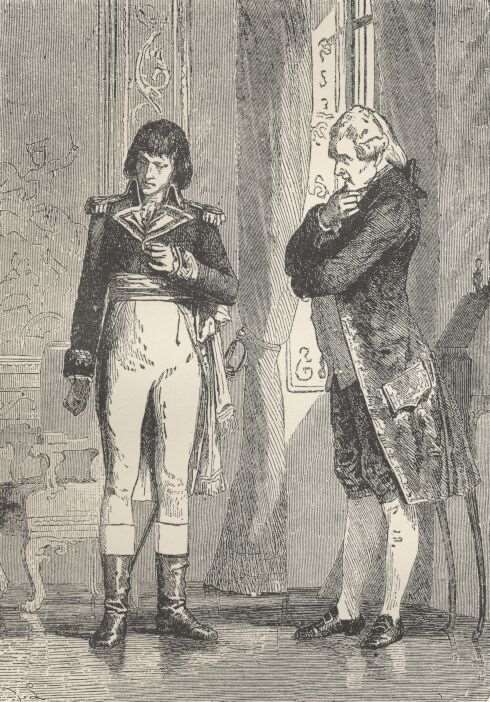
FERDINAND (pale and trembling). How? What? Nothing – it is nothing, my father!
PRESIDENT (casting upon him a dreadful look). Should there be cause. If I should discover the source whence this obstinacy proceeds! Boy! boy! the very suspicion drives me distracted! Leave me this moment. 'Tis now the hour of parade. As soon as the word is given, go thou to her ladyship. At my nod a dukedom trembles; we shall see whether a disobedient son dare dispute my will! (Going, returns.) Remember, sir! fail not to wait on Lady Milford, or dread my anger!
[Exit.
FERDINAND (awakens, as if from a dream). Is he gone? Was that a father's voice? Yes, I will go – I will see her – I will say such things to her – hold such a mirror before her eyes. Then, base woman, shouldst thou still demand my hand – in the presence of the assembled nobles, the military, and the people – gird thyself with all the pride of thy native Britain – I, a German youth, will spurn thee!
[Exit.
ACT II
SCENE I. – A room in LADY MILFORD'S house.
On the right of the stage stands a sofa, on the left a pianoforte.
LADY MILFORD, in a loose but elegant negligee, is running her hand
over the keys of the pianoforte as SOPHY advances from the window.
SOPHY. The parade is over, and the officers are separating, but I see no signs of the major.
LADY MILFORD (rises and walks up and down the room in visible agitation). I know not what ails me to-day, Sophy! I never felt so before – you say you do not see him! It is evident enough that he is by no means impatient for this meeting – my heart feels oppressed as if by some heavy crime. Go! Sophy, order the most spirited horse in the stable to be saddled for me – I must away into the open air where I may look on the blue sky and hear the busy hum of man. I must dispel this gloominess by change and motion.
SOPHY. If you feel out of spirits, my lady, why not invite company! Let the prince give an entertainment here, or have the ombre table brought to you. If the prince and all his court were at my beck and call I would let no whim or fancy trouble me!
LADY MILFORD (throwing herself on the couch). Pray, spare me. I would gladly give a jewel in exchange for every hour's respite from the infliction of such company! I always have my rooms tapestried with these creatures! Narrow-minded, miserable beings, who are quite shocked if by chance a candid and heartfelt word should escape one's lips! and stand aghast as though they saw an apparition; slaves, moved by a single puppet-wire, which I can govern as easily as the threads of my embroidery! What can I have in common with such insipid wretches, whose souls, like their watches, are regulated by machinery? What pleasure can I have in the society of people whose answers to my questions I know beforehand? How can I hold communion with men who dare not venture on an opinion of their own lest it should differ from mine! Away with them – I care not to ride a horse that has not spirit enough to champ the bit! (Goes to the window.)
SOPHY. But surely, my lady, you except the prince, the handsomest, the wittiest, and the most gallant man in all his duchy.
LADY MILFORD (returning). Yes, in his duchy, that was well said – and it is only a royal duchy, Sophy, that could in the least excuse my weakness. You say the world envies me! Poor thing! It should rather pity me! Believe me, of all who drink of the streams of royal bounty there is none more miserable than the sovereign's favorite, for he who is great and mighty in the eyes of others comes to her but as the humble suppliant! It is true that by the talisman of his greatness he can realize every wish of my heart as readily as the magician calls forth the fairy palace from the depths of the earth! He can place the luxuries of both Indies upon my table, turn the barren wilderness to a paradise, can bid the broad rivers of his land play in triumphal arches over my path, or expend all the hard-earned gains of his subjects in a single feu-de-joie to my honor. But can he school his heart to respond to one great or ardent emotion? Can he extort one noble thought from his weak and indigent brain? Alas! my heart is thirsting amid all this ocean of splendor; what avail, then, a thousand virtuous sentiments when I am only permitted to indulge in the pleasures of the senses.
SOFHY (regarding her with surprise). Dear lady, you amaze me! how long is it since I entered your service?
LADY MILFORD. Do you ask because this is the first day on which you have learnt to know me? I have sold my honor to the prince, it is true, but my heart is still my own – a heart, dear Sophy, which even yet may be worth the acceptance of an honorable man – a heart over which the pestilential blast of courtly corruption has passed as the breath which for a moment dims the mirror's lustre. Believe me my spirit would long since have revolted against this miserable thraldom could my ambition have submitted to see another advanced to my place.
SOPHY. And could a heart like yours so readily surrender itself to mere ambition?
LADY MILFORD (with energy). Has it not already been avenged? nay, is it not even at this very moment making me pay a heavy atonement (with emphasis laying her hand on SOPHY'S shoulder)? Believe me, Sophy, woman has but to choose between ruling and serving, but the utmost joy of power is a worthless possession if the mightier joy of being slave to the man we love be denied us.
SOPHY. A truth, dear lady, which I could least of all have expected to hear from your lips!
LADY MILFORD. And wherefore, Sophy? Does not woman show, by her childish mode of swaying the sceptre of power, that she is only fit to go in leading-strings! Have not my fickle humors – my eager pursuit of wild dissipation – betrayed to you that I sought in these to stifle the still wilder throbbings of my heart?
SOPHY (starting back with surprise). This from you, my lady?
LADY MILFORD (continuing with increasing energy). Appease these throbbings. Give me the man in whom my thoughts are centered – the man I adore, without whom life were worse than death. Let me but hear from his lips that the tears of love with which my eyes are bedewed outvie the gems that sparkle in my hair, and I will throw at the feet of the prince his heart and his dukedom, and flee to the uttermost parts of the earth with the man of my love!
SOPHY (looking at her in alarm). Heavens! my lady! control your emotion —
LADY MILFORD (in surprise). You change color! To what have I given utterance? Yet, since I have said thus much, let me say still more – let my confidence be a pledge of your fidelity, – I will tell you all.
SOPHY (looking anxiously around). I fear my lady – I dread it – I have heard enough!
LADY MILFORD. This alliance with the major – you, like the rest of the world, believe to be the result of a court intrigue – Sophy, blush not – be not ashamed of me – it is the work of – my love!
SOPHY. Heavens! As I suspected!
LADY MILFORD. Yes, Sophy, they are all deceived. The weak prince – the diplomatic baron – the silly marshal – each and all of these are firmly convinced that this marriage is a most infallible means of preserving me to the prince, and of uniting us still more firmly! But this will prove the very means of separating us forever, and bursting asunder these execrable bonds. The cheater cheated – outwitted by a weak woman. Ye yourselves are leading me to the man of my heart – this was all I sought. Let him but once be mine – be but mine – then, oh, then, a long farewell to all this despicable pomp!



